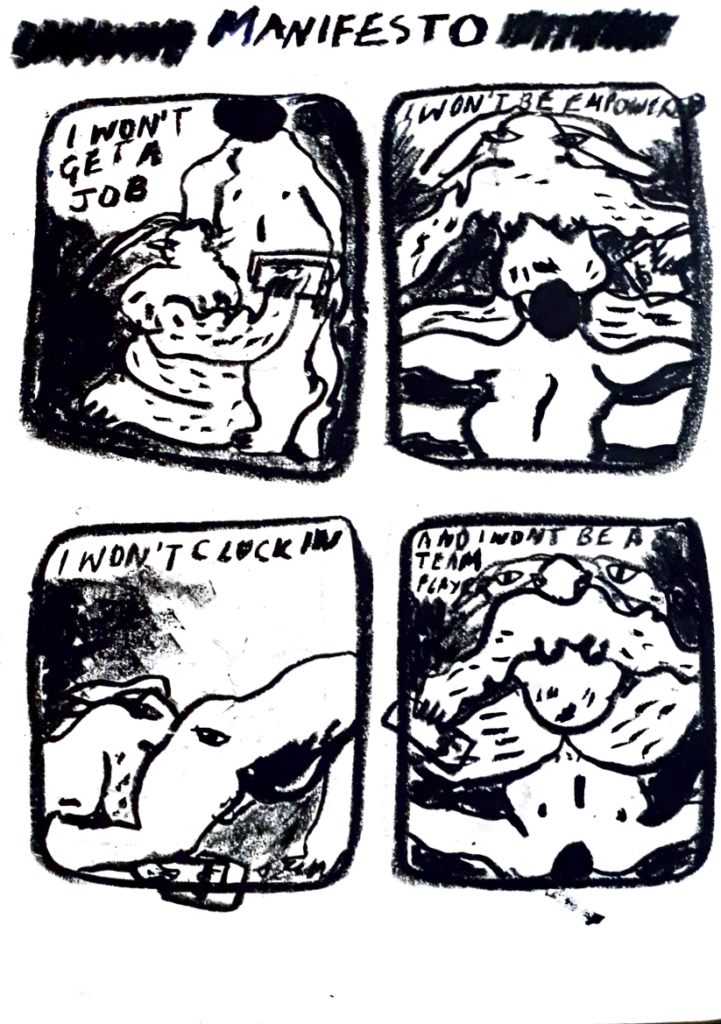
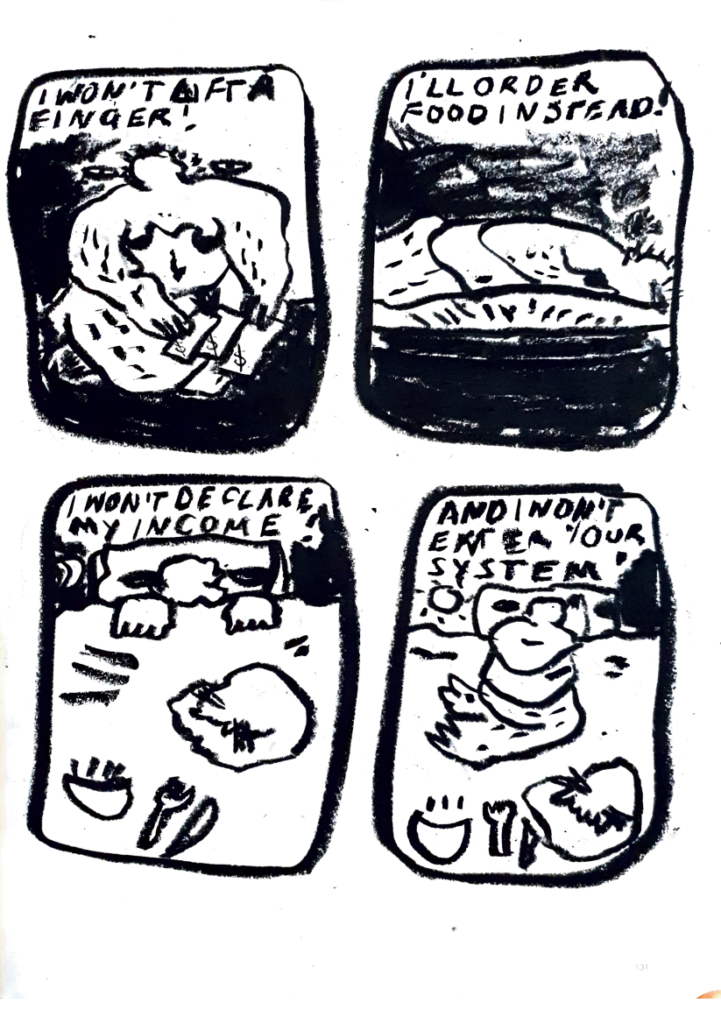
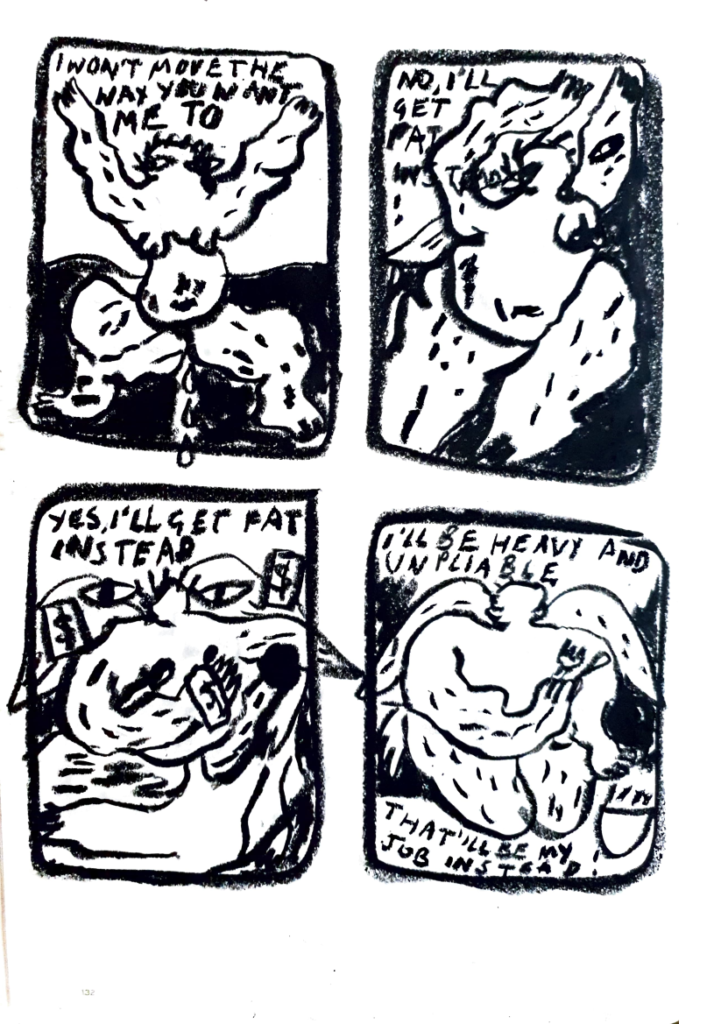

Wild Iris is based in London, UK.
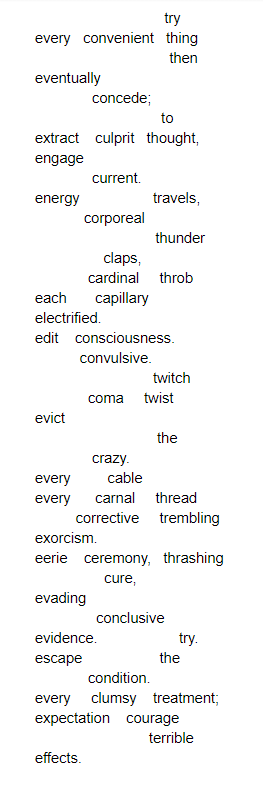
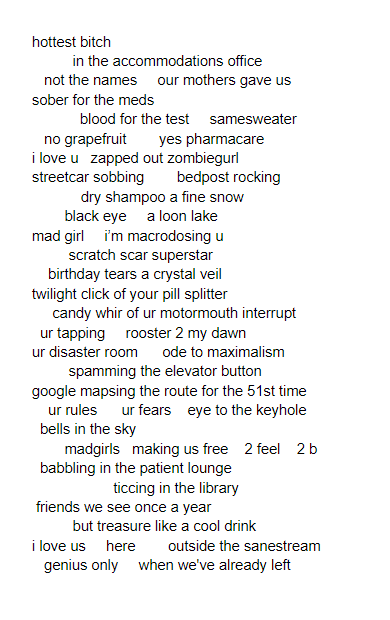
Twoey Gray is an aroace zinester, arts educator, and sweet-tooth poet-ish laaady. Her work has appeared live at the Women of the World Poetry Slam and College Unions Poetry Slam Invitational, and in video on CBC Arts and Slamfind. She is the author of Electrodaughter, a chapbook on her experience receiving electroconvulsive therapy (ECT). Find her at twoeygray.com.
 BACK TO ISSUE
BACK TO ISSUE BACK TO FOLIO
BACK TO FOLIOToo much is what they call you
when your shape is unfamiliar,
when your neurons grow at a different speed,
when you speak in tongues too lilting
for them to follow the rhythm.
Sometimes we miss each other,
our movements and thoughts parallel.
Not enough because they can’t track
what they can’t sense, so we look
like we’re doing nothing
when we’re doing everything,
every motion, every moment a choice
to continue wading through
a current meant for different bodies,
minds that flow the other direction.

K.S.Y. Varnam is a queer, neurodivergent, and disabled Toronto-based writer, artist, and editor, as well as the founder of The Quilliad Press. They share a bedroom with two mischievious parrots, Riff Raff and Wobbles, both of whom regularly feature in their poetry. Much of their work also focuses on neurodivergency, disability, queerness, and feminist themes. Their work has been published in several journals, including Hamilton Arts & Letters, Plenitude, Metatron, The Quarterday Review, Breath and Shadow, CRUSH, and Transition Magazine.
 BACK TO ISSUE
BACK TO ISSUE BACK TO FOLIO
BACK TO FOLIO I slouch low in the Adirondacks Dad built for the porch, hidden behind the juniper bushes, smoking tobacco and herbs. Mara’s thinning ponytail sweeps her shoulders, dull in the morning sun. She speed-walks up and down the block, where her parents can see out their window. Blocks gossip, but, rounding the cul-de-sac, I could’ve guessed she moved home for treatment. I wonder which program—the one that did nothing for me? The one to avoid like the plague? Her frenetic gait echoes in my legs, a memory of ache. My clothes are a bit roomy these days, but more than that, I’m sallow. Wilted as the dry, bleached remains of my curls. Does Mara know I moved home, too, another neighbor kid flunking adulthood? If I walked past, could she read synoptic history in my hair?
My thoughts are homemade fireworks, bright and erratic, a panic of loud. Anyone who looks at me knows what I ate this morning. I don’t want to be seen.
—
Kneeling at the altar of my bedroom floor, nights pass in a fever of symbols. First, graphite and india ink, then watercolors, pastels. I string my childhood bunkbed with clearance fairy lights. Half of them don’t light up anymore and I’m too tall to sit upright in my bed.
Eyes prick my skin with their static. It feels the same as it did as a child, when people watched through my mirror. I locked myself in the bathroom, alone, pressing the tip of my finger to glass. A kid at school said if your reflection touches your finger, one side’s a window and someone could watch. Half a centimeter remained between me and myself. No one watched from within the walls, so they must’ve used cameras or magic.
I made a silly face in the mirror and though: Have fun watching me brush my teeth.
I picked my nose at them for good measure. I’m not afraid of you.
Now, I let the moon in, blinds open well after dark. I draw a self-portrait with antlers wrapped in trumpet vines. When Mom comes in to say goodnight, she winds around art supplies on the floor to close the blinds with a twist.
“Someone could see right in,” she says.
I don’t say: They can go fuck themselves. I want to make art with the moon. I crack them open, just a little, when she leaves.
—
My days soar on winds separate from weather. I’m punctuated. Sudden drops impale, spikes of terror and dread. I vibrate like a tuning fork. With my parents, I try to measure my words, rapids through a sieve. I try not to think the word hospital, in case someone hears, in case thoughts bring things to be.
My ears ring constantly. I track the sound through the house. The high pitches get louder near plugged-in electronics, even if they’re turned off, but my bedroom is loudest of all. At first, I think I’m just hearing berms of my bodily energy built up over decades. Then, I notice the singing. It oscillates on my skin, teeny-tiny multitudes, like carbonated sound.
I have a set of three wooden bowls placed here and there around my room, holding sundry pretty things; trinkets I’ve picked up from the ground, old friendship bracelets, small fossils. The bowl on the bookshelf holds two handfuls of beads. Chips of quartz varieties: smoky, rose, aventurine. They sing—every stone, singing. It’s beautiful. Loud. Sonic energy lifts the hair on my arms as I approach. I pour some into my hands. A few drop to the carpet beside my bare feet.
They sizzle. They actually sizzle. They bubble in my hand. Eyes wide, I laugh, remembering Pop Rocks that turned your tongue green.
It’s some dark hour. Cats and parents sleep. I secret the beads into a thin tulle bag and hide them in my sister’s old bedroom, under forgotten sweatshirts in the dresser that matches my own. When I crawl into bed, the ringing isn’t so loud as it was. Even so, my body still vibrates.
—
I’m exhausted, wide-awake in bed, fairy lights on and eyes closed. In my mind, I’m in the garage, in the Honda, the garage door closing behind me. I park and turn off the car, get out, and two men accost me. They snuck inside when I wasn’t looking. One wields a hunting rifle. They came for my mom and for me.
How might I protect us?
In the world we agree on, my mother serves a church as a solo pastor. Her congregation works with Reconciling in Christ, a process training them to welcome, invite, and be safer for LGBT people. The men in my mind want to punish her for it. For birthing me, too.
The scene plays out in fractal, over and over with minor evolutions. I work through each variation: What if I scream? Fight? Jump back in the car and punch it through the closed garage door? With each run, I learn, refining my choices until it feels right, like I’ve learned something new. Like we’re safe. But no matter how I changes I make, I can’t change the premise. I’m always closing the garage behind my parked car before I get out.
In the world we agree on, I park in the drive way, not the garage. It doesn’t make sense.
—
My dad built a bird feeder shaped like a trough for the deck. Squirrels love it. It’s fastened to the white banister, framed by the family room’s bay window. Birds fly in to feast from our cottonwood trees and the woods beyond the swamp. Once, I saw chickadees, gold finches, cardinals, robins all eating together at once. Then, two blue jays dive-bombed the banister, expansive, territorial. They chased the smaller birds away, but ate nothing from the trough.
A squirrel scampers across the banister with seed-heavy cheeks beyond my mom’s heaving shoulders. She sits in the light of the window in sweatpants, Kleenex beside her. She neglects the crossword in her lap; pen doodles fill up the margins. For three days, Mom stays home from work, sits on the couch, watching reruns, and cries.
—
I can’t remember his car. Dad emailed pictures to block and cul-de-sac so the neighbors can keep an eye out. I’m no longer allowed to park in the driveway; from now on, Mom and I both shut the garage door behind us before we get out of the car and Dad parks where I parked outside.
I can’t remember his name, but Mom says he becomes someone else when he’s drunk. She asked if she could share that I was queer with her congregations if it became professionally relevant. I gave her permission and she preached about me, an example among other stories. Most of the poisonous rage he spat into her voicemail was for powerful women leading the church. But he mentioned me—he remembered.
It’s dark out when I pull into the garage. I sit in the driver’s seat, car off, doors locked against the creaking silence of an engine cooling down. Bare bulbs buzz above me. Threat echoes in the emptiness. If this is too much like my imaginings, it’s too unlike them, too. In my head, I could maneuver. I could choose, reap consequence, learn. Here, alone beneath the rafters full of old sleds and cross-country skis, there’s nothing to outsmart. Only words I never heard, deleted after statements were made and evidence collected.
Tonight, somewhere else, a man drinks until transforms into another man, or he doesn’t. I find myself violently safe.
A fear-shaped space moved home with me, a door held ajar by my thoughts. Maybe that’s how his words slipped into our lives. Or maybe my third eye needs glasses.
—
My parents installed the hot tub years ago, but I use it now more than ever. I turn on the basement fireplace before I go, so it’s warm when I return. The hot tub steams up through the screens that contain it, billows caught in the floodlights that illuminate the foreground cottonwoods, middling swamp grass, the dark backdrop of woods. Anyone looking in would see nothing. Not the robe I hang on a hook by the door. Not the nothing I wear, slipping into the water.
I imagine the man rounding the east or west corner, stomping downhill along the house to break into the basement. It doesn’t feel real. There, though, at the edge where the woods meets the swamp, that place is real. He’d stand there in boots and jeans, hunting rifle in hand, squinting to see past the lights.
I know he’s not there. I don’t know that at all. I flip the bird at his negative space.
I’m not scared of you.
A red light blinks in the darkness. I don’t know what from. My limbs boil limp as noodles. Back inside, I stretch by fire. After a while, I turn on some music and turn off all but firelight. I dance with invisible ribbons and orbs, pulsing colors, pink, indigo, teal. Tangible, I gather and move them with gestures and breath. My body unwinds. They touch me, pull at my sternum. A sun spins. Luminous mountains climb and rise to the beat, small as stalagmites.
Are my eyes open? Does he watch through the window?
I climb onto the love seat and lean over its back to press my finger against window glass. It’s double-paned. My reflection touches me and it doesn’t.
—
Mom goes back to work. Her community rallies after the threats, stronger than ever before. Dad’s at work, too; so is most of the block, but I can still feel someone watching. Backyard, the deck, slunk low behind juniper, someone touches my skin with their gaze. I check for Mara walking laps before I trot down the driveway. Maybe I speed-walk a little, too, just to pass faster, less chance to be seen.
Down where this street meets the next, I turn onto the path to the park. There’s a perpetual groove in its pavement where the swamp reclaims the land with flood every spring. I cross it and stop at the edge of the woods. The breath of the trees presses against me, an envelope. I step through still, gum air.
My shoes rest, obscured by the base of a tree. I leave the pavement for a cold dirt path into the small wood. It’s thinner, now. Dad’s been on a crusade against an invasion of buckthorn. Their bodies line the edge of the path. I light an herby cigarette. Mullein fluffs up the lung clouds like vapor or steam. Blue lotus brightens the colors. The lavender scorches, but I love how it tastes.
I walk barefoot on the thin fallen trunks, toes gripping lichened bark. My balance is shit, but the soles of my feet feel alive on tree, loam, and stone. The path leads me to the white rock doming up front the ground. I hop onto its turtle shell, smudge it with toe prints. The, down and around, past a buckthorn cemetery, down to the swamp across from my backyard.
I stand where I imagined him standing. The man whose name I don’t know, whose car I forgot. I look for boot prints in the mud. If the swamp knows this man, it won’t tell me.
—
There’s a shooting at Pulse Nightclub. I wake up to the news. Mom and Dad are already gone, off to the first Pride fest of her church’s small city, where she and other clergy are to lead a collaborative worship. The man lives in this city. I can’t leave the house.
It’s easy to picture her out in the sun, green grass and a hill, some oak trees for shade, and Mom, in alb and stole. It’s easy to picture her smile, the glow of her freckled face whenever she’s in her element, the professional version of the joy she feels when all her babies are home. It’s easy to picture a burst of bullet, blood, my dad weeping, trying to save her. Maybe he’ll get shot, too. I hover, above and behind myself. I want to turn off June.
Five years ago, my mom asked if she could preach about me. I’d spent the year watching posters melt off cement classroom walls, overmedicated and lost. Mom made it clear that I could say “no.” I said “yes.” Even then, still an angst-riddled teen, I knew this wasn’t about me. It was about the hundreds of people who listened to her speak from the pulpit, who struggled, or loved someone who did. People cried during her sermon. They poured into her office, seeking resources and solace. So many parents, no longer alone in their fear for their child.
Church changed that day. People looked at me different. Despite the broad, discrete strokes Mom painted with, strangers knew an intimacy of me, unreciprocated. They knew why I fled service to hide in Mom’s office, but I didn’t know them.
Once, my mom told me, “I don’t know anyone else who’s helped so many people they’ve never met.”
These words are not a pat on the back; they’re affirmation of choice. Sitting on the window seat overlooking the swamp and the woods, where the blue jays nest, I know I’d make the same choices again. Mom would, too. Madness or queerness, it doesn’t matter. We’d both do it over again.
And I’m afraid.
I’m so afraid.
I’ve never known such fear.
I get up from the window seat and pace the route I used to walk in middle school, gabbing with friends on the phone. The cats snooze away on the back of a couch and I give each a grief-wet kiss. Mom asked us to play Jupiter: Bringer of Jollity from The Planets at her funeral. I turn it on. I can’t pace anymore. I can’t hide or walk away from the clawing in my ribs. I know my mother will die. She won’t be murdered standing tall, but crouched to greet someone’s child, eyes crinkled up by her smile. Dad would take a bullet for her if he could. A well would fill overflowing with all this pride, this grief, this love. In a heap on the hardwood floor, I’m crying and crying and crying.
Mom comes home sun-kissed and sunny in lime green t-shirt and shorts.
Face dry, I ask her, “How did it go?”
“Perfect,” she says, breathless, as though she’d jogged the whole way home. “Fantastic turnout. We couldn’t have asked for a more beautiful day.”
She hugs me. She smells like grass. The garage door stays open all day, breeze dusting across cement floor.
—
I walk barefoot through the woods again. The sun shimmers down between petals of green and everything smells like its growing. I’m joyful, thoughts like a babbling brook, like staring at the sun. Perched on the bright breach of pale boulder in the middle of the path, something magnetic tugs at my breastbone. Giddy, I giggle out loud to myself, close my eyes, and follow the pulling. Flickering small-lights and long strands of color lead me east, away from the rock. Pale blues overlay on the path beyond my sun-bloody lids. Feet quest, stumble, and prick. I turn. There’s a fork in the path, both running south to the swamp.
I peek, slit-eyed. My vision says left. The tugging says right. I try left, then double back when my heart starts pounding, heavy. Still peeking, I walk down the right fork to find three feathers, blue and striped. I find another. Then, the whole bird, a blue jay, dead in the brush, as though he’d fallen right out of the sky. There’s cacophony inside me, frightened, exuberant. I dither a moment, then I race home to grab a plastic bag.
Mom asks from the kitchen, “What are you up to?”
“I found a dead bird. I’m want to bring it home to bury in the garden.”
She eyes me, uncertain. I feel flush on my cheeks, but I grin, grab the bag, and run off. I try not to think the word hospital. Back in the woods, I gather every bit of the bird I can find. It seems almost sacrilege to carry his body in plastic, but it won’t be for long.
I carry him home, sun high and hot. Neighbors work in their yards. We wave hello. I pop into the open garage to grab gloves and a trowel. My feet squelch through a soggy patch of lawn on my way down the hill to the garden by the swamp. Dad gathers fallen branches and rakes while Mom lays out fresh mulch. They’re sweating and scratched, breathing hard from their labors. They’re happy.
Both shoot me questioning looks, but they leave me to my toils. There, where anyone could see, I dig a hole in the dirt. I keep two feathers, the rest of the bird laid to rest. Once covered, I choose five river rocks and press them in a design above his body. Small branches are broken. I shut my eyes and incant something silent and pagan, homemade.
It’s dark, somehow. When did it get dark? I walk the yard’s periphery and find myself alone. Lights on, I can see through the windows, the outside looking in. Dad’s at the kitchen sink, head bent over busy hands. Mom sits at her favorite spot on the couch with her crossword, some procedural on the TV.
At the northernmost edge of the yard, where grass meets the swamp, I press a stick into soft turf, one feather stuck upright, like a flag. East, then south, halfway up the hill, a stick pressed into the ground. South to the curb, then west, I find the southernmost point and press in a stick. West, then north, halfway down the hill, the final stick, stuck in the ground. North again, I walk until the circle’s complete, to seal in the magic.
I hold the final blue jay feather in my hand. Overhead, first, I feel it fly, then I see it with closed eyes. It’s beautiful, loud, a little uncouth, fiercely protecting its home.

E B Joy lives in a little cottage near a river and some lakes. They graduated from Hamline University with a BFA in Creative Writing in 2020, where they contributed to Runestone Literary Journal Vol. 6 as a student editor in 2019 and were awarded the Ridgeway Fellowship for their Summer Collaborative Undergraduate Research, Summer of 2020. Forever Falling Sideways by the Icarus Project published their work in 2013 under a different name. Joy is an active member of the Hearing Voices Network’s local chapter and a Certified Personal Medicine Coach.
 BACK TO ISSUE
BACK TO ISSUE BACK TO FOLIO
BACK TO FOLIOstare at the photo of sun on dog in squares of light sun on light with dog in sun all over in squares of light on a page of pictures in the archive that remembers me always turning dog morning sneaking through the window of the basement where I hide what I refuse to eat in a box of pictures the best way to loop time capture and destroy time ease time away like lit birthday candles reducing themselves to wax throwing shadow on the white rug the blue chair and the charcoal stain behind There are too many COLORS in this house THAT’S why it had to burn give me a photo like a benediction the plural swing of all our hauntings passing over the substitute house like a fleet of men like a parcel of men like MOM there’s a flock of MEN passing over the house no one took any pictures of that but look here’s one where I’m in the parking lot with pink hair one outside the 1998 cooper union national youth poetry slam one at the public pool where I never get high enough to stay casual the air prodding the edges of my skin or here sitting alone in the bitter kitchen downstairs by the stacked boxes with the custody papers I won’t see until later and in this one I am laughing. swanned out on the couch ready for the damage and in this one I am dancing skinny limbs tossed around and in this one I am staring down calculating a dog’s lifespan on my toes the years between then and now divided in squares of light on the carpet in lit squares

griffin epstein is a non-binary white settler from NYC (Lenape land) working in education and community-engaged research in Toronto (Dish with One Spoon/Treaty 13). They have been featured in Glad Day’s Emerging Writers Series, and their poetry has appeared in Grain Magazine, The Maynard and Plenitude, among others. griffin is the author of so we may be fed, forthcoming from the Frog Hollow Press disability chapbook series. They play music in SPOILS, make games with shrunken studios, and develop multimedia work with poet Shannon Quinn and artist bryan depuy.
 BACK TO ISSUE
BACK TO ISSUE BACK TO FOLIO
BACK TO FOLIOThis is how you do it! You strip the scales from your skin, the sunlight shines in, everything returns to its origin, wild from the womb, before the human domestication process, having a body…that’s the problem! and I have one so I stare straight into the sun so sublime it eats my mind fell out of an envelope addressed to who? you? what does blue mean to you when your feeling… blue sky blue sky envelops my mind floating on a river of light entities glistening singing softly…I remember who I am again…I remember those sweet talking sounds of my soul…I remember growing old…I remember being free again…I remember those sun seeing beams made of me…I remember being born…I remember who I am again…I remember those sweet talking sounds of my soul…I remember growing old…I remember being free again…I remember those sun seeing beams made of me…I remember baby… a message from god maybe? a melody for me? my spiritual destiny? The quest in me came to collapsed on the concrete sobbing at the source in secret tears the fraud of my face, this is the part where a brain splits and the sun spits sweet on my cheek like a creek in a dream, and through the crack comes a calling…
[...] [A]nd then I saw the present sharp in perspective, it cuts my guts, it leaks in a cup and I drink It was the edge of experience it was the end of the lie my eye that we are not living in a dying city on a dying planet. It makes me sad. It makes me so sad to see it. It makes me mad and me was overcome by madness so me was evicted from the room me was rentin, and estranged from my family and unemployed so moved into the library of my college and slept on friends floors and eventually stayed up for days and days in a daze reading and reading and reading made me a maze and Felix Guattari made me weep with love for madness maybe me Felix and fell asleep in my car and didn’t mind besides was on a mystical mission to save the world save the world so could not be burdened by housing or boss and stayed up for days and days in a daze and got kicked out of the market for a body zigging and zagging in a maze and a head hit with hammer for sciences donkey brains oozing spilling sewage [...] They were coming for me. Any minute now. imprisoned in a hospital. its all love. They don’t understand. Why are you here breathing this air? Its all love. They don’t understand and so a hand on a gun, a gesture in my body. It shakes. California could have been an earthquake, but it isn’t. So madness my muse why must me messianic consciousness doing itself to me setting me free but what for? And The Empire screams why the FUCK are you here breathing this air? Sir I plead, I think they call it existentialism. I exist so I am the enemy? Why are They trying to destroy me? Its my destiny blacked out backseat banging on the cage blurry fragments of dreams struggling to scream I DIDN’T DO ANYTHING And I could have been an aborted fetus but I was born instead, thrown from a womb, another body belonging to this Evil Empire that never ends, and every body has to belong somewhere, so there I was, where most of us are not welcome, shackled to a stretcher, pissing into a catheter, staring at the ceiling, a white wall, that means nothing, but these blinding lights that desecrate my vision. When in walks a white lab coat carrying a clipboard, it says here that it believes it was personally selected by the sun for a magical mission. Check for magical thinking. Check for grandiose delusions. Hello there, we are going to make you into a submissive member of society, how’s that sound? ….feeling shy today….well if it wants to be a part of society it masters its animal with cruelty and it love dogs on a leash and it hallows out a whole in its head and it lives there and it thinks it is there because it thinks it is a space and not a force and so it is and it sits still or it doesn’t and it drinks the doctors potion and it sits still and it orders its house and it calls it spring cleaning because spring is pleasant and it wants order to be pleasant too and it struggles to turn its rhythms into elevator music and it tells itself it loves elevator music and eventually it does and it always cooks itself by following their recipes precisely and it tastes itself and it tastes disgusting and it is so ashamed of its failure but it never ever unwraps zion’s rotting bacon becoming a beam of god unless it wants to be circled by The Empires army six guns and voices demanding to know why it exists, and we wouldn’t want that would we? No, please, I can obey if I try. I promise. I can curl in a crevice and hide in the whole of the horror. Please don’t murder me. Please don’t murder me. Good, obedience is a virtue, it obeys in exchange for a gentle violence that it calls love and then it matures and takes responsibility for forming itself and it trains a tongue and a lung to form a corporations public relations department and it says GOD BLESS AMERICA!!! blessed are the Americans who can become the apocalypse anytime but can’t stop dreaming about domesticity in this city that ate up their brains and imagination a fascist dog barks I AM THE EMPEROR you brain diseased criminal its your nature that’s the enemy is stabbing me with a needle now I fear nature and I feel nothing
Precious planet where I sleep seed of my dreams temple of trees talk to me sweetly blessedly your child welcome me wild as the wind swept away my soul and gave me a new one sunlight on my skin its easy to begin learning to be alive again when you wake up sleeping on the beach weeping at the sunrise you could die one thousand times for a love they don’t understand [...] the universe is spilling when I weep for tujunga canyon where love comes to die where the military made the river dry where a creek could be a crack comes a calling my consciousness washed in exstasy by our madness my muse for the messianic age before the genocide and I love you so much that I don’t want to leave you behind so I’m drinking malt liquor in this candy coated day dream to calcify my soul so four loko green apple of my eyes sobbing at the sky we are all going to die I cry I’m going home I’m going home dew drops on the moon love fell out of the room so numb numb dizzy waking up with the shakes can you save me from becoming an earthquake so them humans don’t murder me was just trying to make anoth er earth [...] all I am is these negations make nations of our earth where the temple of trees still speaks to me sweetly, says I got put in my place for the aesthetic of a sterile city and you got put in your place too in a box on a box with no windows that you pay for and you pay and you pay and you pay for do you not believe? in the beauty of your nature made of magic could be the kindest cosmos…
contact at [email protected]
 BACK TO ISSUE
BACK TO ISSUE BACK TO FOLIO
BACK TO FOLIOsocial worker <- -> psychiatric patient I am a social worker, a psychiatric survivor, and current consumer. My clients do not know this. They do not know that every morning and night I take a handful of pills to make sure I can meet the demands of society and capitalism. The world has no place for me when I’m not well. When I’m hypomanic, I will take days off work so that I can write, fuck, and spend money. When I’m depressed, I will take days off work to lay motionless in bed for hours on end. At its worst, I end up admitting myself to a psychiatric hospital. My finely tuned cocktail of meds allows me to approach each day with the clarity and patience I might not have if I swing too far in either direction. What does it mean, then, for me to exist as a social worker, a future therapist, and a patient simultaneously? In Exploring Identities of Psychiatric Survivor Therapists: beyond Us and Them, contributor Kristina Yates writes that therapists “are only as good as the work they have done on themselves.” I have done the work and I am still doing the work to be the best James I can be. I engage in therapy twice a week with two of the best therapists I could ever dream of. I believe that my history as a psychiatric survivor will allow for a more authentic empathy. To be clear, this does not necessarily mean that I will self-disclose my past to all clients. I self-disclosed recently to a client who has a bipolar II diagnosis—just like me. She lamented about how she will never be able to do the two things she most wanted: hold down a job or maintain relationships. I remember panicking for a second before I said, “hey, listen, I have the same diagnosis. I have a job. I have meaningful relationships. It’s possible.” What ensued was a powerful dialogue about how the world labels us as “sick,” or “crazy,” and so we go around calling ourselves exactly that when in fact we are so much more. Yates goes onto say that an alternative narrative exists within the psychiatric survivor moment; a narrative about the “possibility of wellness or a good life for many people who have been given psychiatric diagnoses.” Through strategic self-disclosure, I demonstrated to this client that it is indeed possible to be “well” and bipolar. Even still, occupying the space of psychiatric survivor and patient feels precarious to me at times. I worry: what will happen when I, inevitably, have another bipolar episode? How will I be able to maintain a private practice full of clients with potentially high needs when my own needs are quite high as well? How can I help other people when there are days when I can barely help myself? These are all questions that other survivor/therapists have in common—it is important for me to remember that my past does not dictate my future.
self harm as self-destruction <- -> self-harm as survival I have an extensive history of self-harming behavior, going back almost 14 years. It is a hard habit to kick when it is sometimes the only source of comfort and release during a distressing time. I had a really unprofessional, unhelpful, and cruel therapist growing up as a teenager. When I shared with her that I was cutting, she would invite my mother into the room and make me show her. She threatened to institutionalize me—a threat that was very real given I had already one inpatient stay under my belt before the age of sixteen. I came across a journal entry from December 2nd, 2010 in which I write that if I wasn’t allowed to cut, then I would not eat. I had already been starving myself at that point. Like cutting, it felt good. My therapist told me I was “refusing treatment,” but looking back on it now, I do not know what treatment she was even offering me. My cutting, to her, was significant in terms of the risk of suicide, and yet, she did nothing to ease my suffering. “You’re mutilating yourself,” she would tell me, but I begged to differ. For me and individuals like Clare Shaw, a contributor to Searching for a Rose Garden: Challenging Psychiatry, Fostering Mad Studies, self-injurious behavior is done more often than not as a means of survival and is a conscious decision to stay alive: “it’s a uniquely powerful decision to make…there is immense hope and strength, and that in engaging with death we also engage with life: what it means to be alive; what we want from our lives.” If you had asked me why I was cutting back in 2010 I would only have been able to articulate that it simply felt good. Now I see that cutting was a powerful coping skill; a way of “preserving and affirming life.” Cutting, of course, preserved me by keeping me alive during period of suffering. More than that, though, cutting affirmed me by being a physical representation of my internal distress. In her efforts to prevent me from cutting, that therapist of mine only further put a wedge between us. She didn’t see me. She didn’t hear me. She tried to remove my agency and stop me from exerting the only control I had over my life at that time. She simply did not understand that cutting was not a means of destruction, but rather, survival. I rarely cut these days, although it happens sometimes. What has helped me the most is my network of supports. I have two therapists who make me feel safe, cared for and heard, and a psychiatrist who has spent more time listening than prescribing. We have all put in the work to make sure I stay alive.
Katie <- -> James
Katie lives inside of me and she doesn’t even have to pay rent. Katie is James; James is Katie. I am a transgender man and Katie was the short version of my birth name. Katie exists, even in this moment in time, as a teenage girl. She’s not an ordinary teenage girl though—she’s crazy. She hurts herself compulsively and worries—if not scares—others in her life with her frequent extreme emotional states. It is Katie who comes to visit when I, James, am lying peacefully in bed at night mere moments from sleep. She creeps into my psyche and pokes and tears at all of my sore spots until I desperately need a release from the pain caused by trauma. The thing about Katie, though, is that she doesn’t mean to hurt me. She’s usually trying to lead me to something deeper within myself.
In my past musings on Katie, I have asserted that she had to die so that James could live. Upon further reflection I have realized that Katie and James can coexist. I am okay with sharing this space with her. My Gestalt therapist pointed out that it appeared that the battle between the Katie and James was like two waves competing for who got to be the ocean. Indeed, on many days, it does feel like a battle. Katie is traumatized, timid, and not able to appropriately self-regulate. James is at peace, thriving and has deep insight into his moods. There are days where Katie wins, and that’s okay; I simply set the bar lower on those days. It is important to note that Katie, also, cultivated a life worth living for James. It is Katie who pursued psychiatry, therapy, and social work. It is Katie who pursued the social and medical transition into James.
My therapist recently posed the theory: what if Katie was never actually suicidal? “It’s plausible,” I told him. He went on: what if Katie was simply responding to the external stimuli around her? That landed for me. Katie wasn’t “too much.” Everyone else was simply not enough. So no, perhaps Katie was never actually suicidal. Perhaps she was simply after something far richer than what was offered around her.
All of My Selves I have spent years agonizing over whether Katie and James can share a body, and I have spent nearly as long wondering if my tendency for self-harm totally discredits my work as a social worker. What if I could simply, just be, and relish in the plurality of myself, my body, and my work? I am reminded of my undergraduate thesis on Orlando, by Virginia Woolf. Orlando, the central character, exists across centuries, and survives heartbreak, war, and a fantastical gender transition. Above all else, Orlando takes interest in the fact that one does not have to live as the same self for the entirety of one’s life. It is true that after 22 years of living as Katie, I was utterly sick of her. After beginning my transition in 2016, I did everything I could to banish her from my mind and body. 2020, for me, has been about making my peace with Katie. I looked to Orlando for advice. Orlando’s life spans four long centuries and by the 17th century, Orlando is “sick to death of this particular self. [She] want[s] another.” The use of “another,” does not mean death of the old self, but rather a coexisting of identities. Every day I work to become the best version of myself. I realize, now, that my best self is equal parts Katie and James. Katie might not be how I present anymore, but she is still inside of me. I want to be the social worker and therapist that Katie needed when she was younger. I want to show up for other queer and trans folks, for the bipolar kids and teens, and show them that it is possible to live a full life and do meaningful work. I will come to these folks as James, with Katie’s scars on his arms, but I will come ready and willing to fight for them.

James Macaulay McManus is queer/neurodivergent/trans man/social worker who hopes to open a private therapy practice.
 BACK TO ISSUE
BACK TO ISSUE BACK TO FOLIO
BACK TO FOLIO <!DOCTYPE html>
<html>
<body>
<h2>delete history</h2>
<p id="demo">i tried my best and it wasn't enough. i ate your breakfast and spat out your spinach. angelfire xanga livejournal wordpress. </p>
<p id="demo">web 1.0 control system system control you</p>
<button type="button" onclick="myFunction()">this is me trying.</button>
<script>
function myFunction() {
document.getElementById("demo").innerHTML = "this is when i finally fell asleep";
}
</script>
</body>
</html>
* An HTML script which runs at https://www.w3schools.com/code/tryit.asp?filename=GJIAQ5GHMSIY
“She mimicks the speaking. That might resemble speech. (Anything at all.) Bared noise, grown, bits torn from words. Since she hesitates to measure the accuracy, she resorts to mimicking gestures with the mouth. The entire lower lip would lift upwards then sink back to its original place.” – Theresa Hak Kyung Cha, Dictee
To meet diagnostic criteria for ASD according to DSM-5, a child must have persistent deficits in each of three areas of social communication and interaction (see A.1. through A.3. below) plus at least two of four types of restricted , repetitive behaviors (see B.1. through B.4. below).
Specify current severity:
Severity is based on social communication impairments and restricted, repetitive patterns of behavior.
Specify current severity:
Severity is based on social communication impairments and restricted, repetitive patterns of behavior.
Note: Individuals with a well-established DSM-IV diagnosis of autistic disorder, Asperger’s disorder, or pervasive developmental disorder not otherwise specified should be given the diagnosis of autism spectrum disorder. Individuals who have marked deficits in social communication, but whose symptoms do not otherwise meet criteria for autism spectrum disorder, should be evaluated for social (pragmatic) communication disorder.
** The elided text is from the diagnostic criteria for Autism Spectrum Disorder from The American Psychiatric Association’s Diagnostic and Statistical Manual, Fifth Edition (DSM-5).
did your skin pull frays from dining table linen did
fruit knives carve toes out of calcified chairs did
my words crack our wooden coat hanger apart did
an absence of apology break this bottleneck spell did
it then crush our chalk-lined hands did
sirens come get me after you called did
they scream in my body like a lost child did
every impulse grow iridescent ash fall did
thirty-three steps on our way to mend did
that feel too hard for us to swallow did
you think of my grandmother when you told on me did
you dream about tracing a line to yours did
I ask too much of you with a dirty dish tongue did
you spit out chicken bones with coals in your socks did
I wrap seventeen sheets across my face then stop did
it hurt too much to tell the truth on this couch did
it burn too much to leave our bathroom lights on did
you hang them out after dark for my corridor did
you see your imperfections at sunrise did
you forgive me for finding its shadows did
you let me forgive you too did you let me before you did
I sublimated my violent temper
to give myself 50 orgasms in one night
I picked my egg shell towel from off the floor
and made a leather jacket out of your Birkenstocks
I changed my name to petty
just to change it back to Pretty Petty
I told myself I was enough
enough times my tongue fell off
and I said, “oh no” except it sounded more like
owo
I realized everything I ever said to you sounded like a Hamlet
soliloquy remixed into a 24-hour lo fi hip hop anime girl studying YouTube video
I forgot everything you ever said to me
I wrote a sci-fi thriller about us taking down Chip Wilson
just to wake up to realize you’re Chip Wilson’s assistant
I want to dress up for Halloween as Ketchup Chip Wilson
but don’t want to appropriate white people culture
(anyone… have any advice on that?)
if I projected all my intergenerational trauma onto you
then why aren’t you playing and selling out multiple nights in a row at VIFF?
I will never be a Christmas person but this year you left me
enough of you to weave a tinsel of saliva around my winter boots
as tired and stretched and ridiculous as an American
Girl doll accessory hair ribbon
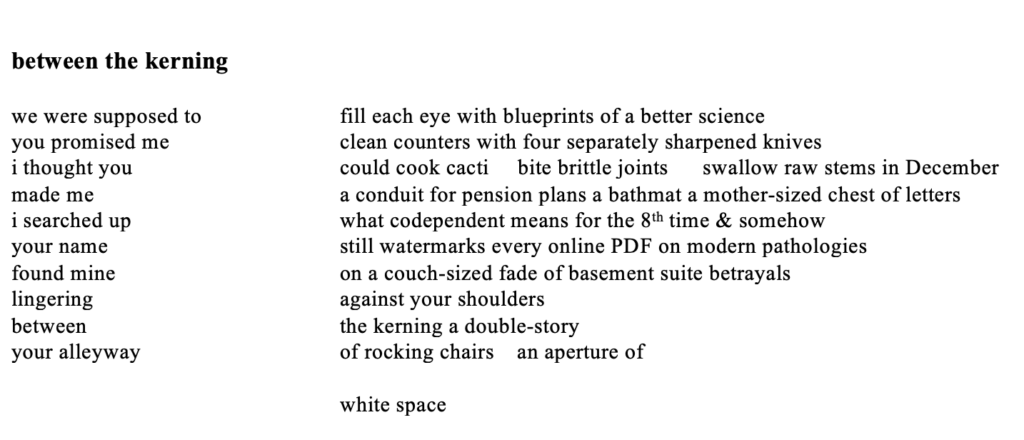

Jane Shi is a queer Chinese settler living on the unceded, traditional, and ancestral homelands of the Musqueam, Squamish, and Tsleil-Waututh peoples. Her writing has appeared in Briarpatch, Canthius, Plenitude, and Arc, among others. Her other accolades include being called aggressive, a Spoiled Brat, a no xiaojie, and “someone who should dress like her intellect.” Clinicians have applied Freud to her bisexual sitting habits to disastrous results. Someone once said she has BPD and should get help. Someone else asked her to google how to assert boundaries. She made up her own search engine which told her she’s autistic, instead. She wants to live in a world where love is not a limited resource, land is not mined, hearts are not filched, and bodies are not violated.
 BACK TO ISSUE
BACK TO ISSUE BACK TO FOLIO
BACK TO FOLIOVideo description: In a black-and-white VHS style recording, a goth queer of ambiguous gender wears cat ears, round glasses, and a vintage leather jacket in front of a large microphone as they read a poem about divinity.
The poem read in this video was first published in Nectar Poetry.
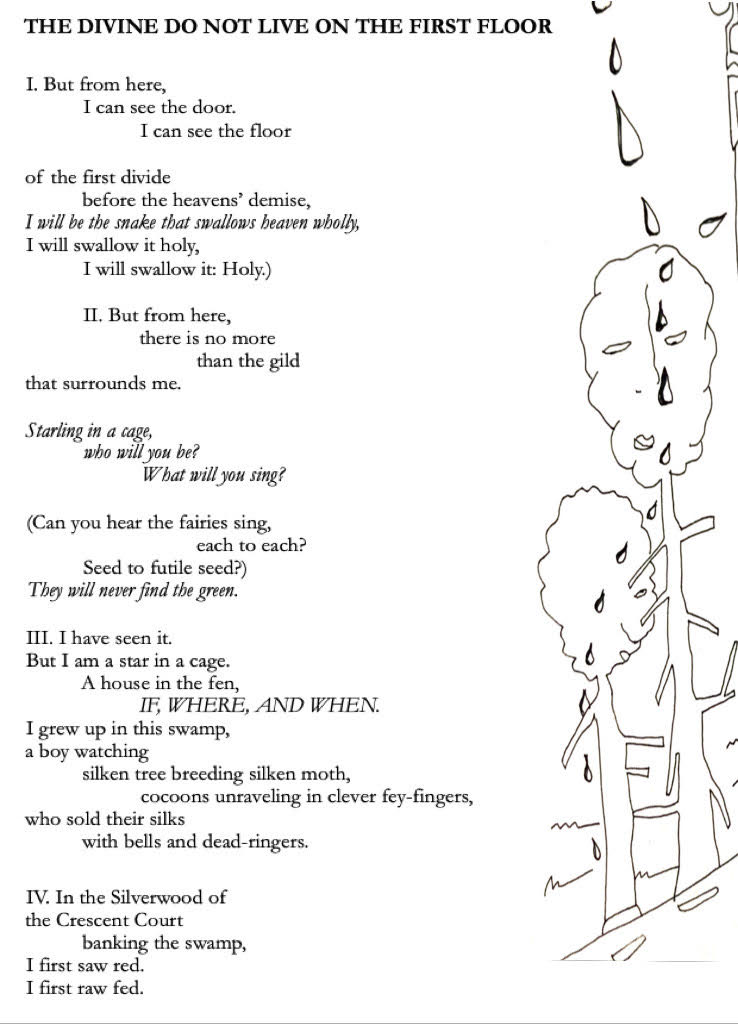
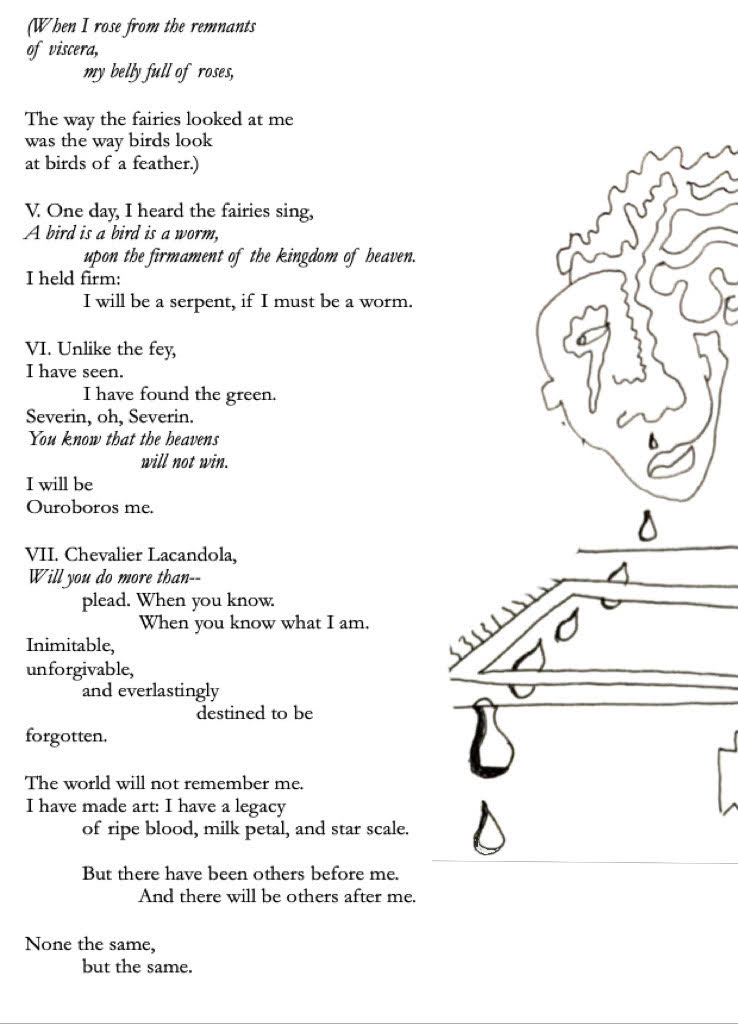
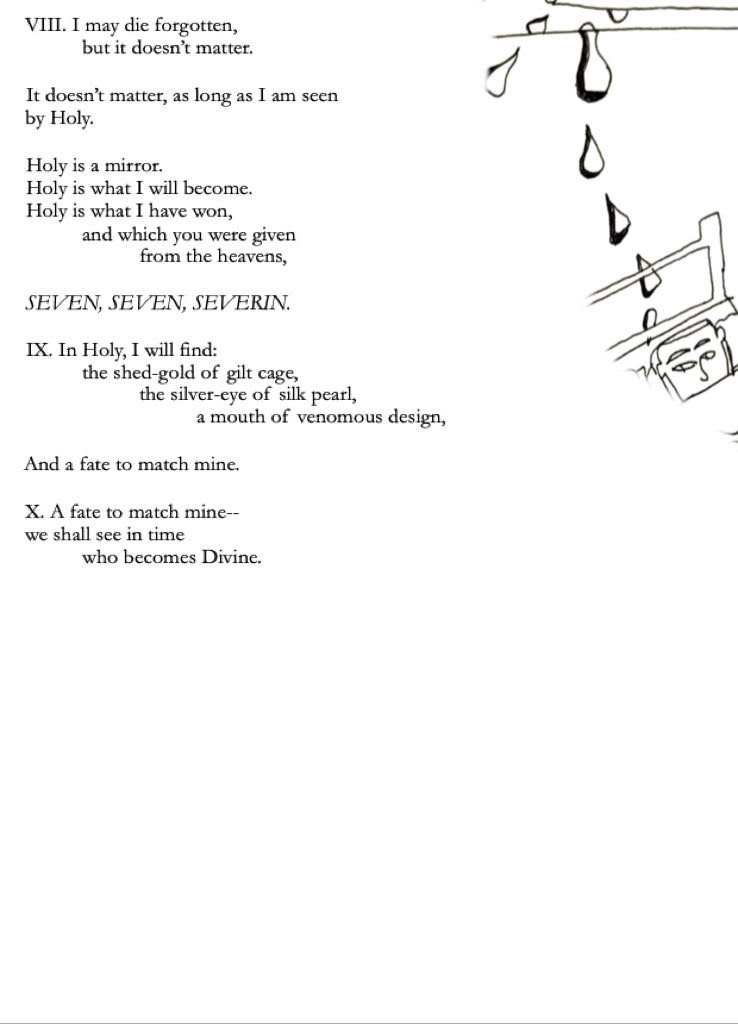
Artist Statement:
Goth catboy in leather jacket reading poetry about the monstrous divine at an open mic in the 90s recorded on VCR.
The poem is part of my THE FAIRIES SING EACH TO EACH (TFSETE) narrative poetry collection which will come out someday, perhaps 2021-2022. The stageplay / lyricbook hybrid version is coming out at the end of February with Flower Press.
TFSETE is about a madness that makes you feel a deep connection with the divine. I am Mad in the way all traumatized schizophrenics are, which is to say completely unlike one another and the vast swathes of people that populate the Kingdom of Earth.
Amadeus Vu, the main character of TFSETE, has an obsession with the divine fey and being a man who will become Empress of Heaven. For Amadeus, this obsession is characterized by a monstrosity bred from a madness that has a uniquely traumatized formulation but no specific DSM category.
In THE DIVINE DO NOT LIVE ON THE FIRST FLOOR, there exists this concept of who will remember you when you die? As an artist, a creator, who will remember your work? What legacy will you leave behind? And are you not destined to be forgotten, if not now, then someday? I think a lot about what it means to be a chronically ill, Mad artist whose particular medicated schizophrenia enables them to be a creative polymath and a rational failure.
The Sword of Damocles hangs on a thread above me, and it is only a matter of time before it falls. To be Disabled & Mad is to live a doomed existence. But, I said once something that I want to live by. The odds are against me, but the gods are on my side.
The odds are against Amadeus, but the gods are on her side. Even if he will be forgotten.

Xuan Nguyen || FEYXUAN is a fey orchestral music composer, writer-poet, and illustrator-designer. Their recent projects have involved the solo development of aesthetic interactive fiction games exploring the nuances not exclusive to the following: power, trauma, madness, nonbinariness, divinity, and monstrosity. Their chapbooks include LUNG, CROWN, AND STAR (Dec 2020, Lazy Adventurer) and THE FAIRIES SING EACH TO EACH (Feb 2021, Flower Press), and their upcoming novella is LIAR, LIONNESS (March 2021, Flower Press). Someday, they’d like to create something that makes them feel like Revolutionary Girl Utena does.
 BACK TO ISSUE
BACK TO ISSUE BACK TO FOLIO
BACK TO FOLIODo you speak more than one language? Have you long wished to be multilingual but have felt too intimidated, or unequipped? I suppose you might think about the nature of language in very traditional sense, as cultural constructions attached to or deriving from geographical regions, but language formation is very much a product of the consciousness, and as such, linguistic construction and practice transcends geography. For a moment, I would like to take you out of your usual conceptions about the meaning of language. Seeing language as a product of geography is a very normal thing to do and it happens when your consciousness has been instructed to think about language and life through the limitations of The Literal and The Simplistic; but there are other, abnormal, less literal, and more complex, ways of looking at language that are –just as if not– more fulfilling.
You have, no doubt, encountered “sign language,”– American Sign Language (ASL), but the study of language, through lexicology and semiotics, tells us that that the signs and symbols that comprise human languages expand beyond individual systems of application or titles.
Have you ever wondered what a LESBIAN LANGUAGE might look like? Lesbianism is not traditionally thought of as a language, but there have been lesbians, like poet Adrienne Rich, who have urged readers to consider that there are shared experiences among lesbians that should be recognized and honored through language and linguistic practices. Rich’s The Dream of a Common Language suggests that the connection between consciousness and language can play a role in the development and survival of communities, particularly of communities that are oppressed or endangered in some way.
Sapphic languages exist and hexist: that they have existed since the dawn of Sappho.
I have created this website to share with you fragments of my what I call my ‘Sapphic consciousness’ as well as to introduce to you the substitutive linguistic practices in which I strive to disrupt and dismantle certain traditional linguistic practices, including some normative uses of the ‘rules’ of grammar and punctuation in Standard American English.
Hex Linguistics, or Sapphix, is one of many projects that are part of my ongoing study of language and identity.
Let’s get started.
SAPPHIX is part of the Sapphic system of HEX LINGUISTICS. It is a hexperiment with language and is always in-process. SAPPHIX is ever-evolving and non-static, like Judith Butler suggests about gender performativity; it comes to hexist via the mobility of SAPPHIC SUBSTITUTIVE PRACTICE. In this way, it is practice writing theory rather than theory generating practice. I began engaging in Sapphic substitutive practice on a whim, in the spirit of fun and just playing around with words, especially with the beginnings and endings of words. Over time, I became a hexpert and a mistress (or mystic /mistrexx – linguistic subversions ‘master’) in the Sapphic substitutive practice.
While I had no prior knowledge of Mary Daly’s work in Wickedary (what she did not call but what was Sapphic Substitutive Practice) when I began engaging in these linguistic hexperiments; I consider Mary Daly’s Wickedary, as well as the work of Gertrude Stein, as being source material for Hex Linguistics and Sapphix, and in all of my applications, I recognize and give credit to Daly and Stein for laying the foundation for what has evolved into Sapphix and Hex Linguistics. I recommend highly that if you are interested in learning Hex and speaking Sapphix fluently, you first read something by Stein and Wickedary by Daly. A dose of Chaucer wouldn’t hurt, either.
Before you proceed any further–
If you engage in SAPPHIC SUBSTITUTIVE PRACTICE, or if you practice THE ART OF HEX LINGUISTICS, and if you apply the language of SAPPHIX, please note, in the spirit of citation, that you are doing so.
Hex Linguistics is an art, and, therefore, what I consider a form of magic. Lavender Magic. (Anyone can read ‘the classics’, but very few know how to read (the) Sapphix…)
The most basic of all Sapphic Principles:
The (x)=(ad) Head/Hex Substitutive Principle from The (Hypo-thetical) Book of Sapphix.
If He(x) = He(ad), then (x) = (ad).
See ‘figure’ below for a compelling example.

Hex Substitutive Principle (x)=(ad):
(X) = (AD) / (x) = (ad)
Application Formula: Insert substitutive principle (X)=(AD)/(x)=(ad) into any linguistic context in order to perform a substitutive linguistic hex on –or to HEX– the patriarchal use and to engage in the Sapphic subversive linguistic practice of the language SAPPHIX.
If you want to Sapphically encode something and make it hard for others to understand, you can apply the principle: as much or as little as you see fit. You can apply it in instances in which it looks aesthetically pleasing to you and can be understood by others, or you can apply it to baffle and totally confuse your reader, rendering yourself in some way safer from comprehension and judgment, which may be of use or interest to you, depending on how interesting you find language and whether you want to try to develop a degree of proficiency in the art of coding, ala Sapphix.
Sapphix must always be used with a sense of humor and with linguistic longing. It will not work otherwise (for instance, if you don’t know the traditional meaning of the word “parody,” don’t even think about trying to understand Sapphix).
There is a formula to the Sapphic principle of Sapphix (as you witnessed above), but subverting the formula to suit your Sapphic needs is always encouraged, as long you cite Sapphix and the Sapphic Sphinx.
Hexamples for your Sapphic Codification Pleasure:
Sex –> Sead (“I haven’t had Sead in ages” or “God you’re so Seady.”)
T-Rex –> T-Read (“Look out; Tyrannosaurus Read is about to eat you!”)
X-Ray –> Ad-Ray (“How long has it been since we took ad-rays of your crooked mouth?”)
Examine –> Eadamine (“It is time for me to eadamine you; get on the table.”)
Flex –> Flead (“Flead those non-existent muscles”)
Exact –> Eadact (“Eadactly: that is Eadactly what I did not mean.”)
Experiment –> Eadperiment (“I want to be your lesbian eadperiment.”)
Elixir –> Eliadir (“She poured the Sapphic eliadir down her throat, and voila!”)
Juice box –> Juice boad (“There is too much high fructose corn syrup in this juice boad!”)
Read –> Rex (“What do we do after school? We rex. We rex books. Ever heard of them?!”)
Bedspread–> Bedsprex (“She lay buried beneath a bedsprex infused with lilac extract”)
Saddness –> Sxdness (“Her eyes were transfixed on the sxdness of the portrait.”)
Radical –> Rxical (“Rxdical lesbians support transgender rights!”)
Misadventure –> Misxventure (“I begged her to take me on a misxventure”)
Steadfast –> Stexfast (“My love for Fraggle Rock was stexfast; nothing could move it!)
Advent –> Xvent (“The cat was grateful for the xvent of the French Angel Fish in her terrarium.”)
Hex linguistics involves the deliberate practice of Sapphic substitution: the substitution of traditional morphemes (prefixes, suffixes, roots) and letters for Sapphic morphemes (prefixes, suffixes, roots) and letters.
Of course, the most effective uses of the (x)=(ad) Sapphic Substitutive Principle are those that involve words that have ‘HEAD’ or ‘HEX’ built into them.
Spearhead = Spearhex
Fiddlehead = Fiddlehex
Beachhead = Beachhex
Blackhead/Whitehead = Blackhex/Whitehex
(Or, if you’re a witch, the obvious: Greenhead = Greenhex)
Metalhead = Metalhex
Heady = Hexy
Headstart = Hexstart
Headcase = Hexcase
As far as HEX words becoming HEAD words: the reversal can and should be done. However, the hex words, in and of themselves, warrant attention just as they are for the purposes of hexification (or Sapphic Redefinition).
Hexarchy is a word that traditionally refers to a group of six states, but the Sapphic definition is this:
Hexarchy: An alliance of six Sapphic states of mind that combine in a cauldron of Sapphic consciousness to perform Sapphic anarchy against patriarchal and heteronormative govern(mental) forces.
This is the magic of hex. The magic to create Sapphic meaning, at will. And it is only the beginning, only scratching the Sapphic surface of Hex Linguistics.
Who might be interested in hex linguistics? Anyone interested in language or lesbian culture and writing.
Hex linguistics will expand with the hexpansion of your consciousness, but only if you, by Sapphic nature or Sapphic nurture, have developed a Hexth Sense.
A hex is spell conjured by a linguistic witch.
The application of a linguistic hex has to do with dismantling grammar and disrupting patriarchal, heteronormative usage. Hex linguistix creates space for something else to exist (to hexist). It is the art of creating Sapphic meaning– the subversive creation of something new.
What, for instance, is a ‘beachhex’? What is ‘fiddlehex’ and what is ‘spearhex?’ New language uses creates opportunities for new definitions and applications. This is what some writers do!
Such words, of my invention, warrant an dictionary entry in the Sapphic Dictionary of Hex. Words invented using Substitutive Principle of Head/Hex (ad)=(x) become part of the language of SAPPHIX, and I define them using my Hexicology and background in Sapphology.
Hex is synonymous with Head for preliminary purposes, but when the substitution of ‘hex’ for ‘head’ occurs, the synonymic limits of language dissolve.
Note: Reproduction rights to the image from Madchen in Uniform were purchased from ASP for personal, non-commercial use by the webmistress, HJ.
The linguistic practices that I refer to as ‘Sapphix’ and ‘Hex Linguistics’ grew out of encounters I had in high school with Shakespearean wordplay and, subsequently, the influence of my undergraduate encounters with the substitutive work of Ferdinand de Saussure’s semiology. The shifts in my awareness of possibilities in my own language uses, especially with grammar, grew over time and with private practice. The language play with which I experimented was very much connected with my exploration of identity, and I began to see that challenging and moving outside of linguistic norms was connected at a deeper level with consciousness and identity. What I saw in language others could not see, so to speak, and what I thought to do with language, others were not thinking to do, and so I discovered that I could make a language that came from me and my identity as a lesbian –– the language itself and the choices I made when using it came directly from a desire to speak in a language outside the heteronorm, and for me that was Sapphic –– a language for or between women. The new kind of seeing, which recognized Sapphic possibilities in language that heteronormative others could not see, was an art of identity and consciousness-making that I knew would be perceived simultaneously as abnormal and mad. And yet, that seemed to me no reason not to explore and develop it as a language system born of outsidership, having its own set of rules and enacting its own forms of insidership and validation. Thus, Sapphix was created out of a need to communicate in a way that creates possibilities, offers safe subaltern intimacy between its users, and challenges heteronormative linguistic legibility itself by devising its own.
Language can be played with so that new meanings are added or created, or that hidden or double meanings are developed through subversions and substitutions . It is a Sapphic code, its own linguistic system, where the devising of the language is ongoing and wherein the process of creating language is also a space for articulating something that resists legibility: Sapphicism. As we know and conceive of Sappho, the ancient Greek poet, today, there is both contestation and ambiguity surrounding her identity, sexuality, and history. As a figure, she resists legibility and subverts biographical narrative. Her writing and her identity are only available to us in fragments, and in this way, her work resists normative interpretation. The non-sense of the fragment is not without sense: it makes a sense that is not legible through heteronormativity. The nature of the fragment is a mad form of language in that the norms of logical ordering and normative coherence are disrupted. The ‘rules,’ or norms, of language are dismantled by the fragments through which her writing enters the world today. We can try to force the fragments into normative narratives of meaning or identity, or we can choose to learn from the fragment to make new meaning and think differently about language, meaning, and identity.
Sapphix is a manifestation of a pursuit and exploration of the latter. It is an example of my own lesbian “hysterical” expression, not meant to be understood through a normative lens, as it combines my attention to the linguistic practices of lesbians, is derived from my own play with the role of lesbian linguistic hysteria – a pushback against Western medicine’s harmful patriarchal construction of ‘female hysteria,’ and is reclaimative in the sense that the construction of madness – of resistance to linguistic sanist legibility – is an act of agency and empowerment. My interest in contributing to mad epistemologies is focused primarily on the way that Sapphix brings attention and study to the subjects of diversity in legibility and linguistic justice. It draws wisdom from the normatively-illegible, that is, what is illegible and inaccessible to a heteroneuronormative majority but legible and accessible to a neurodivergent queer mad lesbian minority. By disrupting the idea that we can only engage with language in heteronormative ways and by demonstrating what thinking outside of heteronormative linguistic parameters looks like, I hope to encourage others to claim their power to play with and create their non-normative linguistic systems, as well as to increase understanding around how mad practice can be studied and understood as a praxis. This is a praxis that asserts that madness can be the state of creation of something with its own internal logic that is legible given a wider diversity of lenses for legibility or linguistic apparatuses.

Jessica Lowell Mason is a Ph.D. student and teaching assistant in the Global Gender and Sexuality Studies Department at the University at Buffalo. Jessica has taught writing courses at Buffalo State College, Carl Sandburg College, Spoon River College, and Western Illinois University. She currently teaches courses related to gender, pop culture, and media literacy at the University at Buffalo. A writer, educator, and performer, Jessica has worked for Shakespeare in Delaware Park, Ujima Theatre Co., Just Buffalo Literary Center, the Jewish Repertory Theatre, and Prometheus Books. In 2014, Jessica was awarded the Gloria Anzaldúa Rhetorician Award by the Conference on College Composition and Communication. Some of her poems, articles, and reviews have been published by Sinister Wisdom, Lambda Literary, Gender Focus, The Comstock Review, Diverse Voices Quarterly, Lavender Review, Wilde Magazine, IthacaLit, The Feminist Wire, and Praeger. Her first chapbook, Woman in Disguise, was published by Saltfire Press in 2013. Her first full-length book of poetry, Straight Jacket, was published in 2019 by Finishing Line Press. She is the co-founder of Madwomen in the Attic, a feminist mental health literacy organization in Buffalo, NY.
 BACK TO ISSUE
BACK TO ISSUE BACK TO FOLIO
BACK TO FOLIO